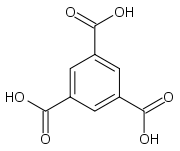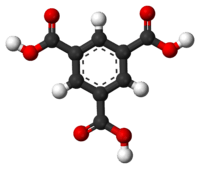Trimesic acid
 | |
 | |
| Names | |
|---|---|
| IUPAC name
benzene-1,3,5-tricarboxylic acid | |
| Identifiers | |
| 554-95-0 | |
| ChEBI | CHEBI:46032 |
| ChEMBL | ChEMBL77562 |
| ChemSpider | 10665 |
| DrugBank | DB08632 |
| EC number | 209-077-7 |
| |
| Jmol-3D images | Image |
| PubChem | 11138 |
| |
| Properties | |
| C9H6O6 | |
| Molar mass | 210.14034 |
| Acidity (pKa) | 3.12, 3.89, 4.70[1] |
| Hazards | |
| MSDS | Oxford MSDS |
| R-phrases | R36 R37 R38 |
| Except where noted otherwise, data is given for materials in their standard state (at 25 °C (77 °F), 100 kPa) | |
| | |
| Infobox references | |
Trimesic acid, also known as benzene-1,3,5-tricarboxylic acid, is a benzene derivative with three carboxylic acid groups.
Trimesic acid is a planar molecule (and is one of only four benzenecarboxylic acids with that property).[2]
Trimesic acid can be combined with para-hydroxypyridine to make a water-based gel, stable up to 95 °C.[3]
Trimesic acid crystallizes from water in a hydrogen-bonded hydrated network with wide unidimensional empty channels.[4]
See also
References
- ↑ Brown, H.C., et al., in Baude, E.A. and Nachod, F.C., Determination of Organic Structures by Physical Methods, Academic Press, New York, 1955.
- ↑ ZORAN MARKOVIĆ, DALIBOR BADJUK and IVAN GUTMAN (2004), Geometry and conformations of benzenecarboxylic acids. J. Serb. Chem. Soc. volume 69 issue 11, pages 877–882 (paper JSCS 3214), UDC 547.584/.585:539.193:54.02
- ↑ Li Ming Tang and Yu Jiang Wang (2009), Highly stable supramolecular hydrogels formed from 1,3,5-benzenetricarboxylic acid and hydroxyl pyridines. Chinese Chemical Letters volume 20, issue 10, pp. 1259–1262. doi:10.1016/j.cclet.2009.04.030
- ↑ F.H. Herbstein (1987), Structural Parsimony and Structural Variety Among Inclusion Complexes, Top. Curr. Chem., volume 140, p. 107